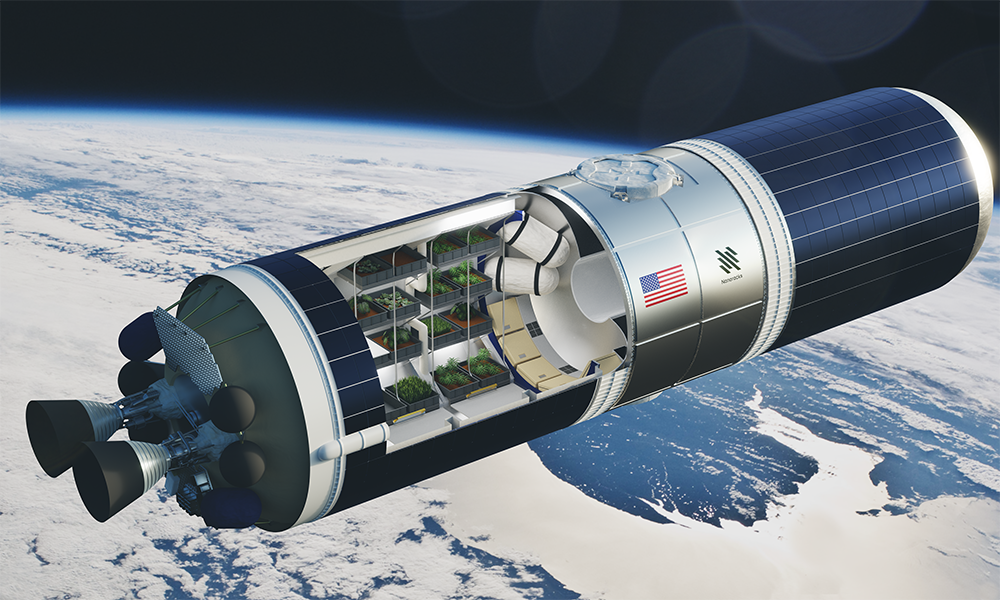
Could food grown in space greenhouses save us here on Earth?
Commercial space services company Nanoracks plans to use orbiting greenhouses to create super-resilient crops that would thrive in the harshest environments on Earth and help to ward off the looming food crisis resulting from climate change, the company announced in 2020.
The company, based in Houston, Texas, signed a contract with the Abu Dhabi Investment Office (ADIO) to open a space farming research center in the United Arab Emirates (UAE) that would research resilient crops, fly them in space and subsequently test the ability of the crops to grow in arid conditions on our planet.
According to Nanoracks CEO and co-founder Jeffrey Manber, this work builds on decades of research that shows that new mutations in the DNA of plants can emerge in the harsh environment of space that could then lead to the creation of new varieties capable of thriving even in challenging conditions on Earth.
Related: Astronauts harvest 3 different crops and try new gardening tech
"There have been many published papers over the years showing specific instances where, in the harsh environment [of space], some interesting biomass products emerge that can do quite well even in desert conditions," Manber told Space.com.
"These plants evolve in space either through changes on the genetic level or through the effects of radiation, the absence of gravity or a combination of all these factors."
According to Professor Liu Luxiang, of the Institute of Crop Science of the Chinese Academy of Agricultural Sciences, China, China has developed and approved more than 200 space-mutated crop varieties for agriculture use since the 1990s. In fact, the second most popular wheat variety currently grown in China, Luyuan 502, was developed through space breeding.
"Through flying seeds and other plant material in space on recoverable satellites, manned space missions and high altitude platforms, we have developed varieties of various crops including vegetables, wheat, maize and soybean," Liu told Space.com. “Through the DNA mutations that occur in space and subsequent selection and breeding, we have created varieties that have higher yields, better nutritional profiles and resistance to diseases, and also require less water or tolerate higher temperatures.”
China, Liu added, invests into the various plant breeding technologies to ensure it will be able to feed its nearly 1.4 billion population amid the progressing climate change.
The UAE, which, according to Manber, currently imports 90 percent of the nation’s food, is looking to space for similar reasons. With 80 percent of the country made up of deserts and an overall lack of freshwater resources, only about 5 percent of the UAE is currently cultivated, according to The Food and Agriculture Organization of the United Nations data from 2016.
"Research in food production under the extreme conditions of space may hold the key to improving our capabilities in desert and arid climates,” ADIO spokesperson told Space.com. “That is why we support Nanoracks as it explores agriculture innovation in space that can be applied to food production in extreme climates on Earth.”
The StarLab Space Farming Centre that ADIO will create with Nanoracks aims to study and develop new types of bacteria, microbes, biofilms and plants that would subsequently be sent to space either to the International Space Station or as part of other cooperations that Nanoracks plans to develop.
"We hope that at the end of 2021, we will be able to send our first research from StarLab to the ISS," said Manber. "We might set up a small greenhouse in our Bishop airlock and use it as a test bed and then maybe go into a stand-alone orbiting autonomous platform greenhouse in the next five years."
Manber said that, while researchers all over the world are looking at ways to grow food in space for astronauts on the Moon and Mars, the StarLab research project is quite unique as it aims to use space for the benefit of those on Earth.
"Covid and the climate change really opened our eyes to the fragility of food security in both the developing and the developed world," Manber said. "We believe that there is a research pathway, where space could be one of the contributing solutions to how we can overcome climate change and the increasing hazards of the Earth climate."
The StarLab Space Farming Centre will also develop robotic and automated systems for the maintenance of greenhouses in space, which could also be used to improve the efficiency of terrestrial farming, Manber added.
Follow us on Twitter @Spacedotcom or Facebook.
Article From & Read More ( Could space greenhouses solve Earth's food crisis? - Space.com )https://ift.tt/3aWtsS5
food

Tidak ada komentar:
Posting Komentar